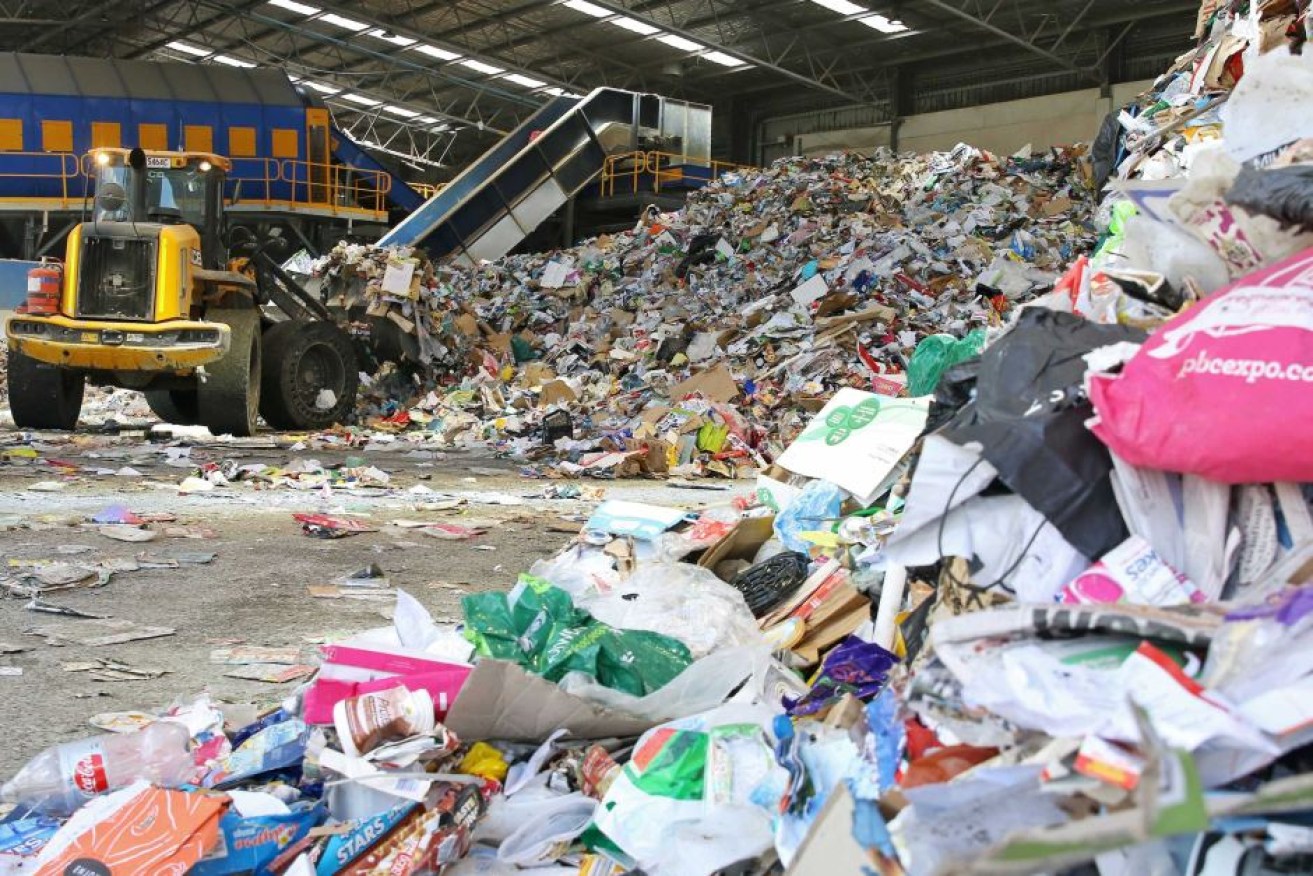‘The demise of kerbside recycling’?: China ban disrupts rubbish removal and fills warehouses

A tractor separates material at Re Group's Hume facility. Photo: ABC/Matthew Roberts
Australia’s recycling industry is feeling the impact of China’s ban on a range of imported recyclable rubbish, with industry leaders warning they cannot keep collecting recycling if there’s nowhere for it to go.
On January 1, China stopped accepting 24 categories of solid waste, disrupting the export of more than 600,000 tonnes of material out of Australia each year.
Now the ban has begun to bite and recycled waste is being stockpiled in warehouses in some parts of the country.
North of Sydney, Hunter Resource Recovery CEO Roger Lewis says it was only a few months until the issue would reach “a critical point”.
“There’s only so many warehouses where you can put stock, and to lease warehouses is expensive,” Mr Lewis said.
“We can’t keep picking it up if there’s nowhere for it to go.”
In Victoria, recycling company Visy will stop accepting waste from 22 regional councils from Friday.
In a parliamentary inquiry into recycling in October, Visy warned without China buying recycled waste, material would start piling up.
“The impacts of the China ban are already being experienced, with stockpiling of product in the hope that prices will improve,” Visy said in its submission.
“This will see a glut of recyclable materials with ‘no home’.”
While the Victorian Government said it was working with councils and the companies to resolve the standstill, it was unclear where that recycled material would go.

A worker at a scrap metal recycling facility at Tongzhou, Beijing. Photo: ABC
What happens to our recycling?
Currently, recycling companies collect, sort and store waste.
Much of it is then packaged and sold overseas for further processing to convert it into reusable raw materials.
However, under the ban, one of the major routes to send recycled materials overseas for that processing is now closed.
Industry leaders said Australia lacked the infrastructure to do that work onshore.
So, to deal with the excess, contractors began filling warehouses with stockpiles of recyclables.
“I think we made the mistake, everyone nationally and internationally made the mistake, of looking to China to be the quick fix,” Mr Lewis said.
He said the China ban could lead to a national crisis, unless councils and governments acted quickly.
“If we — as in all governments at all levels — don’t step up and address this as a collective issue, then we could see the demise of kerbside recycling.”
What are some possible solutions?
This should be the wake-up call governments need to invest in local recycling infrastructure, Mr Lewis said.
“I think this is a good opportunity for us now to critically examine how we manage our own waste,” he said.
“What we should be doing is managing it, not exporting it. Dealing with the product ourselves.”
However, adding to the problem for Australian recyclers is a price war with cheap, non-recycled products.
According to Waste Management Association of Australia (WMAA) president Garth Lamb, reprocessed materials are often passed over in favour of cheaper options made overseas using virgin materials.
“We have to have [governments] focused on preferencing things that have a sustainability benefit, that are creating all these new jobs in the community, that are bringing all these range of benefits that onshore remanufacturing brings,” Mr Lamb said.

Glass sand made from recycled materials at Re Group. Photo: ABC/Matthew Roberts
One example he suggested was using Australia’s glut of recycled glass to make road base.
“A lot of the big state government road projects, they could suck up all the glass that’s being stockpiled around Australia into one of these big road projects,” Mr Lamb said.
But he said this was being repeatedly overlooked in favour of newly mined sand.
In a statement, Suez Waste Management agreed governments should step in to assist the local recycling industry.
“Governments also have a role to play in stimulating markets for recycling and recycled products,” the company said.
“We believe there should be policies to compel manufacturers to use more recycled material in their products and packaging, thereby creating sustainable demand for these materials.
“For plastics, we should also be looking at policies to encourage greater use of recyclable materials in products and packaging. For example, California introduced legislation that imposed a minimum of 25 per cent post-consumer recycled content in certain packaging products.”
Mr Lamb said all levels of government needed to assist in finding a solution.
“Recycling in general, and the environment, is supposed to be a federal issue first and foremost — the state of our environment as a whole,” he said.
“Then it becomes state government in terms of managing waste, and then a local government [issue].”
A number of other government and private industry bodies, including Visy, were contacted for this story, but were yet to respond.
-ABC








